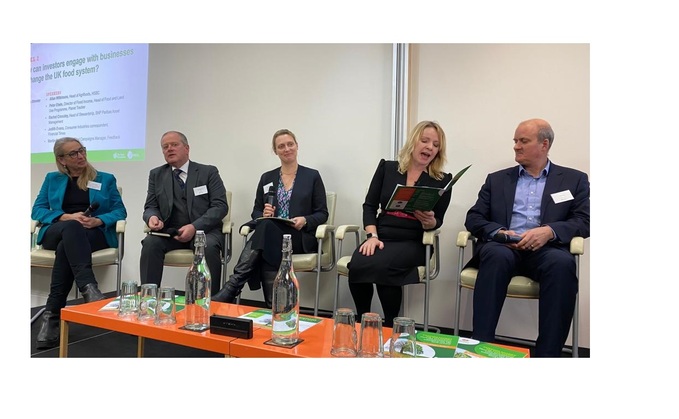
Panellists at Britain’s first food industry investor summit. Left to right: Rachel Crossley, Head of Stewardship, BNP Paribas Asset Management; Allan Wilkinson, Head of Agrifoods, HSBC; Judith Evans, consumer industries correspondent, Financial Times; Susannah Street, broadcaster and commentator (event host); Peter Elwin, Director of Fixed Income, Head of Food and Land Use Programme, Planet Tracker
Most people are aware that the fossil fuel industry - oil, gas and coal burning, is a major cause of the alarming rise in global temperatures and the associated climate shocks of heatwaves, droughts and floods.
Few recognise however, the food system is also to blame. 30% of greenhouse gas emissions are created by what we eat. High levels of meat consumption in many major economies is a particular problem and studies have shown that even if fossil fuel emissions are eliminated, there is no hope of reaching greenhouse gas reduction targets without food system change.
Against this background a group of forward-thinking institutional investors has come together at Britain's first ever food industry investor summit held in London last week [Tuesday Feb 7], with a plan to use their growing clout as a way to steer public policy.
The Investor Coalition on Food Policy behind the summit meeting recognises the need for investor action in the same way energy investors are moving their assets into renewables. Otherwise, they face the risk not just of accelerating the demise of the planet but also of adding to the crippling cost of diet-related disease. Not only that. There is also the prospect of billions of pounds worth of stranded assets as financiers and governments gradually realise that business as usual is no longer an option.
The summit meeting was given a stark call for government action from Richard Walker, the executive chairman of Iceland Foods who supplied a keynote speech to the event read by Stuart Landrum, the company's head of product and process.
‘To achieve societal change, we need to get the whole food industry working together under a strong, clear and consistent government lead,' he said.
‘When governments do intervene, their actions need to be well thought-through and well-implemented, encouraging consumers to make a positive change to their eating habits rather than just hitting people in their pockets.'
The 140 delegates including many representatives from the 23 investment companies in the food industry coalition, were also among the first to hear publicly about the development of the Food Data Transparency Partnership (FDTP) - a new government initiative to develop a consistent set of metrics that will enable all large UK food businesses to report publicly on metrics which will help determine whether the health, sustainability and animal welfare impacts of the food system are improving.
Sophie Lawrence, an expert in sustainable and ethical investment at Rathbone Greenbank Investments and one of the leaders of the investor coalition for food policy, welcomed the introduction of the new system. "It's not about increasing the burden on food businesses it's about getting comparable data so we can make the right decisions as investors, and consumers can have the right information," she said. "The UK will be leading in this kind of regulation, and we hope there will be a ripple effect."
Obesity and diet related disease are increasingly hitting UK productivity, in turn increasing the need for decisive political intervention in the food system: ‘We are only growing a third of the fruit and vegetables needed in the world to allow everyone to eat a healthy diet, and about 12 times too much sugar,' Professor Tim Benton, research director of emerging risks at Chatham House, told the summit.
‘We need to think about how we can work with politicians to get market restructuring right so the incentives are in the right places to make the food that people ought to be eating more available and cheaper and the food they shouldn't be eating less available and more expensive. That requires a radical change.'
Inefficiencies in production and consumer behaviour mean that at least a third of the world's available food is never eaten. ‘Would you invest in a car company that threw straight onto the scrap heap, three or four of all the cars it produced?' asked Peter Elwin of Planet Tracker. ‘If we stay on this path we soon won't have enough planets to go round.'
The summit was also given a preview of what life could be like in Britain if we were to follow other countries that are transforming their food systems. In Denmark there have been a number of initiatives to reduce meat consumption, including an offer to farmers of a share in a £78m bonus pot if they grow plant-based proteins for human consumption.
Rune-Christoffer Dragsdahl from the Danish Vegetarian Society, told the audience the initiative had secured cross-party political support and had been achieved without attracting anger from meat eaters. ‘We are creating an atmosphere where people start to align, but the movement has to seep into the administration, so it is not only understood by politicians who might be there only temporarily.'
‘We want to see government regulation because that creates the right incentives for the right things to happen," said Anna Taylor executive director of The Food Foundation which acts as the secretariat for the Investor Coalition on Food Policy. ‘We are delighted with the response to this event and the level of support it has generated. These are forward thinking investors who recognise the risks to their assets, and that business as usual is no longer an option."
To find out more and join the coalition: https://foodfoundation.org.uk/initiatives/investor-coalition-food-policy
For highlights of the event: https://www.foodfoundation.org.uk/initiatives/investor-summit














